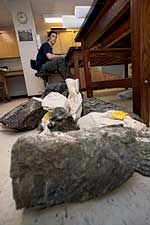Days of Honor
From a Lewiston pool Hall to Carnegie Science Hall, Bates seniors experience the “crucible” of the honors thesis.by Matt Gagne ’04
A half-hour after finishing his honors thesis in economics, celebrated by one clap of the hands

Tim Miller '04 celebrates St. Patrick's Day with a round of pool at Pub 33.
and a fist pump out the Ladd Library door, Bates senior Tim Miller makes his first post-thesis connection between the real world and his academic pursuits.
Hunched over the jukebox at Pub 33, just a meatball toss from Luiggi’s on Sabattus Street, his fingers fire away at the glass screen like the computer keyboard he’s been pounding since September. To win a free song, he has 60 seconds to hit all 41 music notes randomly popping up on the screen. It’s a feat he’ll accomplish several times this afternoon.
It’s 4:30 on a Wednesday, but Miller’s not alone. It is, after all, St. Patrick’s Day, and the redhead is exchanging high fives with reluctant locals at the pool table. He has a certain energy, a simple smile, both scarce in bars before five o’clock, even on St. Paddy’s Day.
In a movie moment, Miller leans across the table, looking to slice the five ball into a corner pocket, when his free song, Johnny Cash’s “Ring of Fire,” rattles beer bottles on a nearby stool. He pulls back from the shot and nods to the beat. The lyrics, seemingly symbolic of Miller’s honors work and the pressure to make deadline — I fell into a burnin’ ring of fire / I went down, down, down / And the flames went higher — lose their luster when a middle-aged woman, sporting ’80s bangs and pulling a Marlboro from its pack, stops to tell him the song is about sexually transmitted diseases. “You know that, right?” she says, propping the cigarette in the corner of her mouth.
Miller is speechless, but he could probably defer this question to senior English major Elyssa Tardif, writing her honors thesis on the treatment of prostitutes in 19th-century English and French fiction. Miller and Tardif don’t know each other, but at Bates in March, the pursuit of honors connects the lives of this select group of seniors.
While most seniors do some sort of thesis project, only about 10 percent pursue the ultimate Bates prize of departmental honors. This year, 52 seniors took on the honors yoke, an experience that culminated in its own Final Four days: 96 hours of endless revisions, no sleep, and one final push to meet a deadline known as “the apocalypse” — Friday, March 19, at 3 p.m.
Tuesday, March 16
All honors candidates feel strain and stress. Some, like geology major Chris Guiterman, end up researching those forces too.

"We're like mini-versions of real geologists," says Chris Guiterman '04.
It’s 8:25 p.m. on the back end of a 12-hour thesis workday, and Guiterman sits alone in the basement of Carnegie Science, in a lab space he shares with fellow honors candidate Kelley Kugel. Surrounding him are maps, rocks, data tables, thesis chapter drafts, buzzing computers, Commons dishes, and Tevas.
Last summer, Guiterman and Kugel did field research in the Presidential Range. Now, he’s writing his final conclusion and packaging his thesis: labeling graphs, numbering pages, fine-combing details. This will last until late Thursday afternoon. Guiterman has a tradition of going skiing on his birthday, and his 22nd will be no different. He plans to hand in the final draft Friday morning and hit the slopes.
Meanwhile in Ladd Library, the weekday hub of student nightlife, Sarah Tolford finds herself between a rock and a hard place. Secluding herself in the basement without her honors thesis, Tolford has to study for an exam in biological chemistry on Friday (her professor won’t let her reschedule).
Including thesis, the Falmouth, Maine, resident is taking five courses, rather than the usual four. She’s on the last leg of her plan to graduate with honors in just three years. “I thought it would be a challenge,” says Tolford, whose bio-chem thesis examines how certain proteins extracted from hyacinth beans could potentially help fight cancer. She came up with the topic after a summer job working at Phylogix, a small Maine biotech company.
Everyone experiences a moment of truth this Tuesday. How well they’ve managed their time since

Sarah Tolford '04 thought it would be a challenge to graduate in three years with honors.
September means the difference between poise and panic in the final hours. Professor of Geology John Creasy once told Guiterman to work on his thesis a little bit every day. “He said if you miss a day, it’s like missing a week,” Guiterman remembers. “If you miss a week, it’s like missing a month. It scared me into doing work.”
In Coram, the Creasy maxim makes John Butos, from New York City, feel like a sophomore. “I had no idea the last week was going to be this tough,” he says. “The easiest part was being able to take time off from it whenever I wanted. Honestly, Friday is going to be my first real deadline, and I give it 50-50 right now.”
At 8:57, the red-headed Miller walks in and collapses at a nearby computer. “My thesis got bumped up,” he tells Butos. Apparently, the outside examiner — an expert who joins a committee that grills an honors candidate — wants Miller’s thesis two days early, on Wednesday.
“If I know people are in tougher situations, it makes me feel not as screwed,” Butos says, waxing rationalistic, as appropriate to a philosophy major.
Having returned to work in Ladd, Miller stops typing just once. “My eyes are starting to bug out. I must look like straight-up hell. A train wreck,” he says, standing to check his reflection in the window. “Oh God.”
Wednesday, March 17
“I don’t set an alarm anymore,” a refreshed Miller says after five hours of sleep. “I come to the library around 7:30 and work basically all day. All I do is thesis. Everything else I just do enough not to do poorly in. It’s draining, but it shows you how productive you really can be.”
The Baldwinsville, N.Y., resident frames the challenge in the language of economics, his discipline. “You’re at Bates for four years, so invest in the human capital. Not to do it is missing out on your potential.”
At seven minutes to 4 p.m., he lets out a sigh that turns the heads of nearby students. But Miller, whose thesis is on Great Britain’s 1972 abandonment of fixed exchange rates, has tunnel vision: from the clock to the computer and back again. “It can never be perfect,” he says. Three minutes to deadline, he starts humming the theme song to Rocky. He still has to hand in hard copies on Friday, but with one final e-mail to his adviser, Michael Oliver, at
3:59, he’s done.
As Miller wanders off to Pub 33, fellow senior Sarah Gray, a neuroscience major, is in scramble

Two nights before Friday's deadline, Sarah Gray '04 droops a little bit yet forges ahead.
mode upstairs in Carnegie. Last night, she misplaced revisions to her thesis (examining whether food addictions in rats predispose them to other addictions, like to drugs). Right now, she’s recruiting people to help edit drafts and pull together her bibliography. “My adviser reads drafts and gets them back on the same day,” she says, “I’d feel bad about not finishing and letting everyone down.” Still, the Orono, Maine, resident resists the urge to hand in just anything come Friday afternoon. “I’d rather have it not turned in than turn it in and be bad,” she says. “I’m not concerned with putting an honors thesis on my résumé.”
It’s the other way around for Elyssa Tardif, from North Attleboro, Mass., who wants to earn a Ph.D. and return, one day, to teach at Bates. “If I wasn’t able to do this, or didn’t enjoy it, then I would have to reconsider my future,” she says. Happily, the experience has pushed her toward the dream. “It’s solidified my plans.”
Geo major Guiterman, of Orange, Conn., also sees a professional connection in his research. “It’s original work,” he says of his field research with Kugel last summer. (The pair also led field trips for geologists, including two from New Zealand.) “We developed our own methods. We’re like mini-versions of real geologists.”
But Tardif is still at least 20 pages from finishing. “I’m amazed at myself for being able to write over 100 pages, but I’ve definitely procrastinated,” she admits. Her roommates, including Tolford, have joined the cause, constantly looking for the “prostitute” in any provocative image. It sparks a passing thought: “I think it would be much easier, and I’d get paid,” Tardif says of working the corner instead of finishing her thesis. “But prostitutes die at the end.”
By now, day and night have been replaced by the glow of monitors and the darkness of blinking eyelids. Butos makes his regular trip to the Den at 11 p.m., where all eyes are fixed on the television and March Madness. Sitting near the back, seniors share some madness of their own. “I kept falling asleep last night but kept typing these incoherent sentences about my dreams, and I sent the draft to my adviser,” Butos says. “I was so afraid I had a dream where I hated him or something.”
Thursday, March 18
Looking their worst physically in what might be their finest intellectual moments, the honors students are on the verge of emerging from what Tardif calls a “crucible.” Minds go numb yet become sharper than ever. Bates’ 52 finest are oblivious to the sacrifices that have brought them so far. They’ve got that “doing-without-doing” thing going.
Geo major Kugel, of Concord, N.H., besides developing a kind of carpel tunnel syndrome in her right wrist, is missing nearly one-third of her softball season, including a preseason trip to Florida, in order to finish her thesis and join Guiterman and others at the Geological Society of America’s conference in Washington, D.C. (Afterwards, their professor, Dyk Eusden ’80, will report that conference geologists were “in awe” of the Bates students’ research.) Musing about his birthday on the slopes, Guiterman jokes, “I think I’ll only be able to ski for an hour or two because I’ve atrophied so much.”
They’ve become intellectual professionals: days begin early enough for breakfast (no rolling out of bed at 11 a.m.), work continues through lunch with a half-hour break for dinner, and their only idle thoughts are if they’ll have time to enjoy a semblance of a weekend.
Marching to a different campus beat, they nevertheless keep their place within it. “It scares the shit out of people” when his radio goes off with an emergency call, Butos says of his late-night duty with Bates Emergency Medical Services, a student-run team of licensed EMTs. “You forget about that part of life when you’re doing thesis.”
For every thesis there is an adviser who often has more than one advisee. These are the relationships you read about in admissions viewbooks but can’t fully appreciate from afar. “We are best friends,” Gray says of her adviser, Professor of Psychology John Kelsey. “We work our asses off. I write drafts and give them to him, and he returns them within the hour. He’s been extremely supportive and encouraging. Without him, my thesis would be a huge pile of crap.”
At 10:45 p.m., Kelsey finishes reading Gray’s final draft, walks it over to Carnegie, and puts it on her chair. Gray, however, is missing. “He came over to say ‘Congrats, this is basically done,'” she says. “But I was taking a nap, getting ready to stay up all night after he ripped the draft apart. But that didn’t happen.”
For Gray and others, self-discovery is replacing self-doubt.
Friday, March 19
To Guiterman’s delight, a light snow falls early. Thesis done, he sleeps in, then heads to Sunday River with two friends. “After stopping to drop my thesis off, of course,” he says.
But thesis students like Butos, who hasn’t slept since Wednesday night, are immune to late winter’s charms. “I really enjoy pulling everything together, but not under this sort of pressure,” he says.
Throughout deadline day, students deliver their theses (an original and three copies) to Academic Services on the ground floor of Lane Hall. The atmosphere is as light as the balloons the staff has hung to celebrate the final day. “I totally feel like something has been lifted off my shoulders, I feel so fresh,” Tolford says.
Others aren’t so upbeat. Around 2 p.m., Tardif leaves Ladd Library with her “heavy-as-hell” binders and makes her way to Lane Hall. “I feel a bit like crying,” she confesses. “I didn’t sleep last night and I’m burned out. I wish I had a few more days to work on it.”Aaron Putnam (geology) of Mapleton, Maine, is the final hand-in; all 52 candidates make the deadline.
Perry Atrium, 4 p.m.
Champagne flowing, professors, thesis students, and their friends gather in Perry. Gray has her picture taken with boyfriend Will Richards ’06 of Easton, Conn., who put together her bibliography as she made final corrections late Thursday night. “He saved my life through the whole project,” she says.
Kelsey walks in, and Gray can’t resist. “What are you doing here?” she asks. “I didn’t turn it in. I scrapped the whole thing at the last minute!” Laughter follows Kelsey’s look of fear.
For their efforts, each student is given a paperweight and T-shirt that says, “Bates College Honors Program 2003-2004.” “Where can you wear that without having things thrown at you?” asks Tardif. Yet five days later she confesses to having already worn it twice.
The tradition of the Bates thesis is a venerable rite of passage, but it’s never been about checking off a requirement towards life after Bates. “I had my ups and downs, but I always thought, ‘This is worth it.’ That feeling never changed,” Butos says.
After the reception (an honors banquet follows in April) Gray goes back to her dorm and checks her e-mail. There’s a message from Kelsey, subject line: “Congratulations.” It reads, “You did it. You had an idea and did it. You hung in there and persisted, nicely done. I am proud of you.”
“That moment,” Gray says, “made all the work and all the pain worth it.”